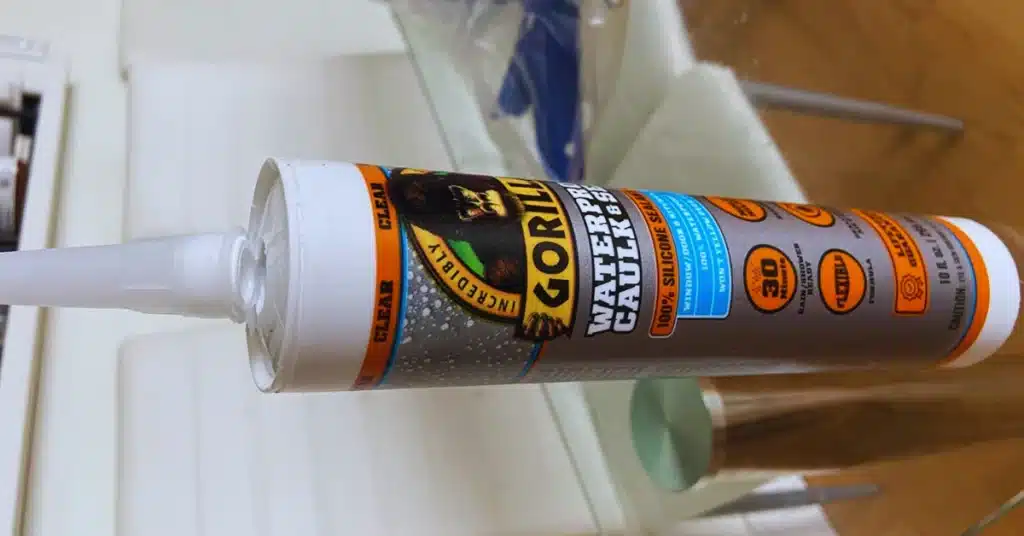When in doubt, know everything about grout caulk vs. silicone comparison first.
Well, the grout is the harder, and the silicone is the softer one. For significant gaps, grout caulk is the suitable one, and silicone is for smaller holes.
Also, silicone has flexibility, and the grout has power. You only need to know what type of caulk you need for your project.
To make it easy for you, the detailed information on the comparison is described below.
Read More: Sanded Vs. Unsanded Caulk
Grout Caulk Vs. Silicone
Grout Caulk Overview
Grout caulk is a rigid sealant. It is a mixture of cement, sand, water, and a little pigment.
As it includes both cement and sand, they make it bulky and strong enough to seal any place, including more significant gaps.
Apply the paste on the gap, then let it harden. You can use it on several surfaces like bathroom fixings, kitchen countertop fixing, and more places like that where it needs coverage.
Besides, it is suitable for more porous materials as well. You can apply grout caulk on any porous surface to prevent mold build-up.
Also, it is waterproof. Make sure the product contains latex that creates a waterproof environment. So, it won’t let water in any place.
To get a rough, strong, and durable outcome, grout caulk is the best product to use.
Read More: Tile Caulk Vs. Grout

Advantages of Grout Caulk
Grout caulk is a strong sealant that has some major advantages. The most incredible advantage is it is easy to use.
There is no preparation required. You can take the paste and directly apply to the area. It quickly sets and makes the job done.
Also, it is easy to clean if there is any residue or applied on any inappropriate areas.
Moreover, as it has a slight color, you don’t need to paint over it. The grout caulk has extra security that makes the place more robust and free of any gaps.
Last but not least, it is waterproof and stain resistant. For cement, it cannot get stained easily. And for the latex, it becomes waterproof.
Read More: Acrylic Vs. Silicone Caulk
Disadvantages of Grout Caulk
Although the amount of advantages of grout caulk is more, there are some disadvantages that you should be careful about.
The main disadvantage is that it may crack a little. As the paste has cement and sand, it makes it dry when cured. And that creates hairline cracks.
Moreover, it is a little more porous. Even the waterproof ones are the same. So, these are some things you should be careful of.
Where to Use Grout Caulk?
Grout caulk is suitable to use on different parts of your house.
You can use it on your bathroom fittings like tile, shower area, toilet base, shower tray, sink, and more where coverage is needed.
It can create a firm line that makes a strong bond and keep the tile in place. As it is waterproof, it becomes the best sealant for the bathroom area.
The grout caulk is best for the corners where the materials meet the wall.
To protect it from moisture, this one is the best. And for not having flexibility, it keeps things in place.
Use it to seal any material but keep in mind that it can crack if not maintained well and lead to water leaking. So, make sure you make an even seal.
Read More: Polyseamseal vs. Silicone
Silicone Caulk Overview
Silicone caulk is a flexible one that can be used in several household places and construction projects.
The primary quality of silicone caulk is it is elastic and provides the strongest bond in the easiest way possible.
Silicone caulk is famous for its flexibility. It is elastic but still seals the materials perfectly.
Moreover, the silicone caulk is versatile, weather, water, temperature, and chemical resistant. So, it becomes suitable for indoor and outdoor applications.
Besides, it can withstand both hot and cold temperatures. And that becomes ideal for professional projects.
It comes in a liquid form but turns flexible after drying. Overall, it is the best product if you want flexibility.

Advantages of Silicone Caulk
Silicone caulk is excellent to apply on multiple surfaces as it has many good features that make it the best.
The most significant advantage of silicone caulk is its flexibility. For having this feature, you can use it in different types of places and corners.
As it is moveable before drying, you can replace it properly if any adjustment is needed. To get an airtight result and strong bonding, silicone caulk is the most suitable one.
Disadvantages of Silicone Caulk
There are some disadvantages of silicone caulk that you must know. First of all, it is flexible and thus complicated to apply.
Also, it has a quick-drying formula. So, if you don’t wipe out excess fast, it will become dry in the gaps, and the smoothing process becomes complex.
All you need is to check the steps correctly and do the entire process according to that.
Where to Use Silicone Caulk?
Silicone caulk is an ideal solution to use on the corners of any place, such as shower trays, edges of it, ceiling edges, and different wall surroundings.
As it is flexible, it becomes easier to apply in these areas. Also, it doesn’t crack. So it can deliver the ultimate waterproofing outcome.
To fix any place, shower tray and bathroom, silicone caulk works the best. It is both flexible and watertight.
Read More: Clear Vs. White Caulk
Which Is The Best? Grout or Silicone Caulk?
The best caulk depends on several things. One of the most noticeable differences is the grout one is on the stiffer side, and the silicone one is on the softer side.
Besides, the grout is not flexible, but the silicone one is flexible. The grout caulk provides much more strength on the surface than the silicone one.
Also, the silicone caulk is harder to apply than the grout one. However, it is better to use on ceilings and corners as it can absorb faster.
So, if you want a robust service for the fixing project, you need the grout caulk.
But if you want a subtle outcome with elasticity and no possibility of cracking, then go for the silicone one.
Are Grout Caulk and Silicone Caulk waterproof?
Both Grout Caulk and Silicone Caulk offer water resistance, but Silicone Caulk generally provides a stronger and more durable waterproof seal. Silicone is less susceptible to mold and mildew growth, making it ideal for high-moisture environments like bathrooms and kitchens.
How long do Grout Caulk and Silicone Caulk last?
The longevity of both caulks depends on factors like exposure to moisture, temperature changes, and the quality of the product used. Silicone Caulk tends to have a longer lifespan than Grout Caulk because of its superior water resistance and flexibility.
Can Grout Caulk be used around sinks and bathtubs?
Grout Caulk is not recommended for areas with constant water exposure, such as sinks and bathtubs. Water and moisture can break down grout over time, leading to cracks and mold growth. Silicone Caulk is a better choice for these areas due to its exceptional water resistance.
Can Silicone Caulk be used in tile joints?
Technically, Silicone Caulk can be used in tile joints, but it may not blend in well with the surrounding grout. If you prefer a seamless appearance, it’s best to use Grout Caulk that matches the color and texture of the existing grout.
How do I remove old Grout Caulk and Silicone Caulk?
To remove old Grout Caulk, you can use a grout removal tool or a utility knife to carefully scrape it away from the joint. Silicone Caulk can be removed using a caulk remover tool or a silicone caulk remover gel. Always follow the manufacturer’s instructions and take appropriate safety precautions.
Can I apply Grout Caulk over existing Silicone Caulk or vice versa?
It’s not advisable to apply Grout Caulk over existing Silicone Caulk or vice versa. Different caulk types have different properties and may not adhere properly to each other, leading to poor adhesion and compromised sealing.
Which caulk type is easier to apply, Grout Caulk, or Silicone Caulk?
Both types of caulk can be applied with a caulk gun, but Silicone Caulk tends to have a smoother consistency and is generally easier to work with. Grout Caulk, on the other hand, requires more precision when matching the color and texture of the grout lines.
Remember to always read and follow the manufacturer’s guidelines and recommendations for the specific caulk product you are using to achieve the best results.
Last Opinion
Now that you know everything about the grout caulk vs. silicone comparison, choose the right one for the project.
For better strength, go for the grout caulk. And for better flexibility and versatility of use on both household and professional use, get the silicone one.
The choice is yours. Make sure you follow the steps and get done with your repair project as soon as possible.
